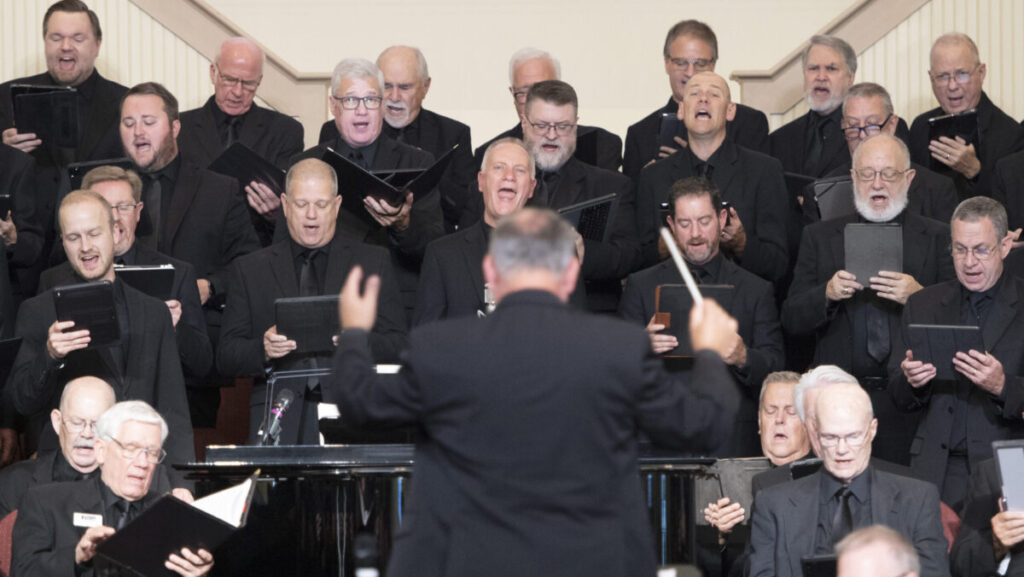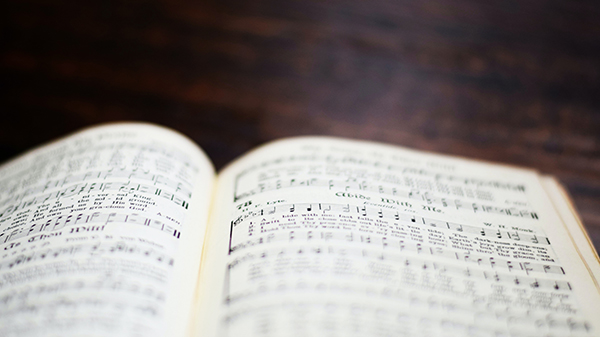Visions of heaven dance in their heads as hundreds of people clap their hands, slap their knees and tap their toes on the concrete floor of the Ronald Howard Gospel Music Center in Canton, Ohio.
Three sisters, members of the southern gospel group Christ Unlimited, take the crowd to a happier place, singing in an upbeat harmony that they are going to “walk right out of this valley with my Lord.”
In a wooden pew in front, Pearl Vitello slowly emerges from her seat and carefully balances on her walker. Vitello, 60, has diabetes, cancer and epilepsy, but that doesn’t stop her from abandoning her walker and rocking back and forth.
The rhythm becomes more insistent with each verse, the voices rising to a majestic pitch until it is certain everyone in this prefab building “ain’t going to let old Satan get me down, down, down.”
“This is her time,” said Vitello’s husband, Richard. “This is her time praising God.”
More people throughout the country are praising God at southern gospel hymn sings, part of a revival of an art form that was an essential spiritual connection for the tens of thousands of white Southerners who came north for industrial work in places such as Cleveland and Akron, Ohio.
Spurred by the popularity of country music, and in particular by the rising tide created by Bill Gaither and the Gaither Vocal Band, southern gospel is making a comeback.
More than a little bit country and more than a little bit gospel, southern gospel, also known as country gospel or white gospel, is reaching beyond its traditional roots.
Jane Way, 70, does not hear a lot of foot-tapping, four-part country harmony at her Methodist church. But she likes to go to hymn sings.
“It just makes you feel good,” she said. “Sometimes you got to let your hair down.”
Despite a five-hour wait on the side of the road for the bus to be fixed, the Pine Ridge Boys — so named despite ages from 39 to 70 — stood unruffled in their dark suits waiting to be introduced.
An old wooden cross was the only backdrop as the quartet led a joyous crowd across a heaven and Earth where people walked hand in hand with a loving God.
“No one can love me like my Jesus, oh, what a friend He is to me,” the group sang to cries of “Amen” and various other whoops of assent.
Satan was not going to come a-knockin’ while this place was a-rockin’.
“It feels good to say, ‘I love you,’” baritone Jerome Bush said amid joyful applause. “Don’t you know Jesus likes to hear you tell Him, ‘I love you’ once in a while?”
The Pine Ridge Boys, who have been singing for 43 years, were part of the southern gospel trail that gave birth to the Blackwood Brothers, the Statesmen Quartet, The Kingsmen and the Jordanaires.
Elvis Presley was among the artists deeply influenced by the music.
Southern gospel was the country music of gospel for a number of years and it grew along with the popularity of country, said Don Cusic, professor of music business at Belmont University in Nashville.
But the music nearly died in the 1980s as many white evangelical Christians, particularly young people, turned to contemporary Christian music.
What reignited the southern gospel industry was the success of Gaither and his band and their commitment to recognizing the history of the movement with a series of “homecoming” recordings, videos and concerts.
Southern gospel now has a magazine, Singing News, and several Web sites track popular artists and current Top 100 songs. Those living in areas that don’t have southern gospel radio stations can find several on the Internet.
Yet for all its recent success, southern gospel still faces considerable challenges — perhaps nowhere more so than in northeast Ohio, where the migration that fueled interest has turned around as jobs disappear and more people head south.
Also many of the generations whose parents and grandparents came in the 1940s and ‘50s from West Virginia, Tennessee, Kentucky and North Carolina have lost their cultural connection to southern gospel. They are growing up with contemporary Christian music.
In a music world focused on marketing hunks and babes, southern gospel performers cling to the idea their music is a ministry, Cusic said.
“The advantage of southern gospel is that it never changed,” he said. “The disadvantage of southern gospel is that it never changed.”
Listen to the songs performed at hymn sings — such as “I’m Going Home,” “He’s Gonna Greet Me” and “Sheltered in the Arms of God” — and the message stays the same: Jesus is a personal friend who guides followers through the raging storms of this life and will walk hand in hand with them into heaven.
The joy of what awaits believers in the future always has been a major part of the appeal of southern gospel, Cusic said. Most listeners are from the working class.
“If you’ve got a working-class life, this life ain’t all that great,” Cusic said. “What do you have to look forward to? Glory land.”





Share with others: